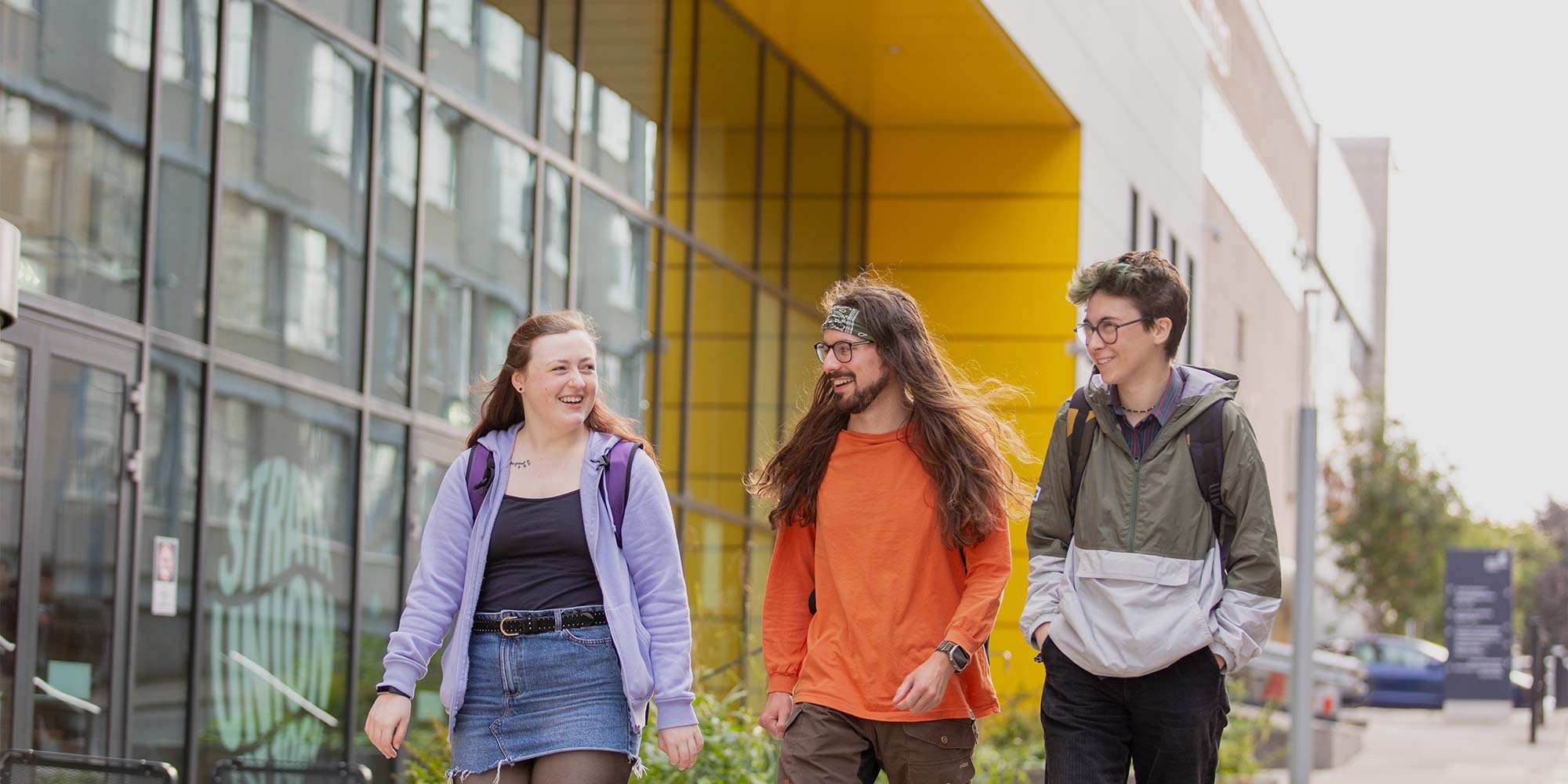MSc Secondary Education
ApplyKey facts
- Start date: Aug 2025
- Accreditation: General Teaching Council, Scotland
- Application deadline: End of July 2025
- Study mode and duration: On campus, 36 weeks including 18 weeks of placement experience plus dissertation
Study with us
Designed for those wishing to follow a career in secondary teaching in one of the following subjects:
- Mathematics
- Physics
- Chemistry
- Biology
- Computing Science
What you’ll gain from this course:
- qualify to teach with an international Masters degree – giving you the potential to teach in locations worldwide
- newly qualified teachers will be able to apply for qualified teacher status (QTS) and become registered with the General Teaching Council for Scotland
- skills in research methods and reasoning
- experience of conducting small-scale research
- learn from on-campus classes and 18 weeks of placements in schools
Why this course?
Teaching is undoubtedly one of the most rewarding careers you can pursue – you will shape the minds of tomorrow!
Teaching at secondary level allows you to share your passion for your subject and open the hearts and minds of your students to new experiences.
This course will provide the theoretical and practical starting point to your teaching career. You will acquire the skills, attitudes and competencies to communicate in the classroom.
The course is unique in allowing you to work in the field of a small-scale research study, which will lead to the qualification of MSc.
This course will equip you with the theoretical knowledge and practical skills you require. The programme is modular in structure, and students will study three modules across the year:
- Education Studies; Professional Values
- Professional Learning Through Enquiry
- Professional Skills
- Professional Skills - Curriculum and Pedagogy
- Professional Skills - Professional Practice
Students attend classes on campus followed by blocks of continued learning on placement. The modules run in parallel, and learning and practice are cumulative.
The MSc Secondary Education allows you to apply for Qualified Teacher status and register with the General Teaching Council for Scotland. This qualifies you to teach in Scotland and other locations worldwide (check with your local teaching authority for suitability).
Dissertation & research methods
The course offers a coherent experience for students. It aims to enhance students’ standing in the professional educational community by introducing them to the practice of research in education.
Students will first undertake training in education research design and methods, including preparing a proposal for a small-scale research project. This proposal will provide the basis for a project that will be completed in the final phase of the course and written up in the form of a dissertation.
The experience of preparing, carrying out, and writing up a research project in an area of professional relevance will enable students to progress their understanding of education according to evidence and position them to move forward in their careers with the capacity to develop and communicate research-informed pedagogies that enhance teaching.

Placement
You'll spend 18 weeks of the course on placement in a school within Scotland. You'll be continually assessed while there to show you meet the requirements for the Standards for Provisional Registration.
You must attend your placement school throughout the full working day. You must also attend school on staff in-service days unless told otherwise by your school.
Placement is your chance to put what you're learning into practice. You'll explore your own teaching style, learn new techniques and develop relationships with your pupils.
You must keep a portfolio of progress while on placement. This placement file will form part of the evidence of your meeting the Standards for Provisional Registration and prepares you for career-long professional learning.

What you'll study
Course structure
| Year | Semester | Content | Credits |
|---|---|---|---|
| Year 1 | Semester 1 | Teacher Education | |
| Year 1 | Semester 2 | Teacher Education | |
| Total at end of Year 1 | 120 credits (80 Masters) | ||
| Year 1 | Semester 3 | Research Methods and Reasoning | 20 Masters credits |
| Year 2 | Semester 1 | Dissertation | 60 Masters credits |
| Total Credits | 200 credits | ||
Work placement
Placements in schools are allocated through the local authorities and the university working together matching students to schools based on the information provided by students.
You should not normally be required to travel in excess of 90 minutes each way to your school placement from your term-time address. Students are not permitted to seek placements independently. Travel expenses are met by students.
Learning & teaching
Students will be engaged in full-time learning via lectures, seminars, group work and independent study.
During school placements, students will attend school five days in each of the 18 weeks of placement. Students will be expected to arrive before the school day begins in order to be fully prepared for their classes. Students are also expected to be available for planning meetings and other school responsibilities at the end of the school day.
Research-driven learning
The Strathclyde Institute of Education emphasises practical, hands-on learning through its strong ties with the school sector and General Teaching Council for Scotland. This ensures that graduates are career-ready and equipped to tackle real-world situations. With a focus on research, and professional development, the Institute fosters an environment where teaching and practice-based learning is up to date and at the forefront of current thinking.
Campus & facilities
Strathclyde’s modern campus features advanced classrooms, high-tech laboratories, and collaborative learning spaces designed to enhance the student experience.
Assessment
There are written assignments and presentations along with an extended dissertation towards the end of the studies.
You are continually assessed jointly by university tutors and teachers in school while on placement and must keep a portfolio of progress. This placement file will form part of the evidence of your meeting the Standards for Provisional Registration and prepares you for career-long professional learning.
Entry requirements
The entry requirements are based on the requirements set by The General Teaching Council for Scotland (GTCS).
All applicants must meet the minimum entry requirements before the course starts.
The minimum entry requirements that we ask for are a degree validated by a higher education institution in the United Kingdom or a degree of an equivalent standard from an institution outside the United Kingdom. This degree should contain at least 80 credits relevant to the subject you wish to study and you must be able to demonstrate an appropriate knowledge of this area of study. An ordinary degree, or international equivalent.
All applicants demonstrating the required entry requirements will be invited to an interview with a subject leader.
Evidence that the applicant has also studied at least two of the following areas (as well as Mathematics and English):
- science
- social studies
- expressive arts
- religious and moral education
- technology
- languages.
We encourage you to apply even if you do not have any of the above so that your application can be assessed as a whole by our team.
| Maths & English |
The following alternative qualifications in English will be accepted:
If you have a different qualification and would like us to check against entry requirements, please get in touch with hass-pgde-selection@strath.ac.uk. |
|---|---|
| English language requirements | You're required to have a suitable minimum level of competency in the English language if your first language is not English or if you haven't been educated wholly or mainly in the medium of English. For postgraduate studies, the University of Strathclyde requires a minimum overall score of IELTS 6.5 (no individual test score below 5.5) or equivalent. Tests are valid for two years. Pre-sessional courses in English are available. If you’re a national of an English speaking country recognised by UK Visa and Immigration (please check most up-to-date list on the Home Office website) or you've successfully completed an academic qualification (at least equivalent to a UK bachelor's degree) in any of these countries, then you don't need to present any additional evidence. If you're from a country not recognised as an English-speaking country by the United Kingdom Visa and Immigration (UKVI), please get in touch before making your application. Please note that IELTS isn't equivalent to a Higher (SCQF Level 6) English qualification. These are two separate requirements. In order to meet the PGDE entry requirements, you'll be required to have both or equivalent. PVG and overseas police check requirements All applicants who have been offered a place on the programme will be required to complete an application to join the Protecting Vulnerable Groups (PVG) Scheme or an application for existing PVG Scheme Member through Strathclyde University prior to starting the course. Students will be required to pay between £18 to £59 depending on the related work they apply to. If applicable, applicants who have been given an offer will also be required to obtain the relevant oversea(s) certificate(s) of good conduct. |
| Experience & references | Experience
Relevant experience should be noted in your personal statement. At present, it's difficult for all potential student teachers to access schools to gain experience in support of their application for programmes of Initial Teacher Education. Where possible, opportunities should be sought to gain experience in contexts which involve working with children and/or young people. ReferencesApplications made via the University direct system require two references. This should be an academic reference if you are a current student or recent graduate (ie within the last 5 years). A professional reference (current/recent employer who can testify to your suitability to teach) is acceptable if you graduated more than 5 years ago. This can also relate to any voluntary experience you have working with children/young people. A reference must be included with your application; only in very exceptional circumstances will we consider an application without one, and you must explain in your personal statement why this has been omitted. The reference should be provided as soon as possible as no offer can be made until the reference has been received. References from family or friends are not acceptable. |
Fees & funding
Fees may be subject to updates to maintain accuracy. Tuition fees will be notified in your offer letter.
All fees are in £ sterling, unless otherwise stated, and may be subject to revision.
Annual revision of fees
Students on programmes of study of more than one year (or studying standalone modules) should be aware that the majority of fees will increase annually. The University will take a range of factors into account, including, but not limited to, UK inflation, changes in delivery costs and changes in Scottish and/or UK Government funding. Changes in fees will be published on the University website in October each year for the following year of study and any annual increase will be capped at a maximum of 10% per year.
| International | Full time, 16 months: £25,000 with the potential to be awarded a scholarship of £5,000 |
|---|---|
| Additional costs |
|
How can I fund my course?
International
The Faculty of Humanities & Social Sciences is delighted to offer MSc Secondary Education International scholarships worth £5,000 to all eligible postgraduate taught, self-funded, international fee-paying offer holders, joining the MSc Secondary Education programme in August 2025. Please note, the scholarship will be available for year one of this 18-month programme only.
Careers
A degree in education will equip you for a range of careers working with children and young people.
Opportunities to become registered teachers with GTC Scotland. Achieving the MSc Secondary Education and registering with the GTC Scotland will open potential opportunities to teach in a variety of locations around the world (check with your local teaching authority for suitability).
Secondary School Teachers in Scotland use the Curriculum for Excellence framework. They work with their class to develop skills and abilities and encourage the pupils to expand their knowledge and understanding further.
Typical jobs
Jobs related to this degree include:
- Secondary Teacher
- Head Teacher
- Further Education Lecturer
- Special Educational Needs Teacher
Working hours
During term time, you'll officially work a 35-hour week but you may have to work more. You'll be in school before the school day starts and stay after the pupils leave. Most teachers take their marking and preparations home to do in the evening.
You'll also participate in parents evening, after school clubs and activities and school trips.
Holidays
A teacher's total working year is 195 days including five days for in-service training. Every year you'll get 40 days holiday at full pay*.
*Source: Teach in Scotland.
Other jobs
There are also many options for those who decide not to go into the classroom. Some alternative job roles are:
- Charity Adviser
- Youth Worker
- Museum Educator
- Education Liason roles
- Private Tutor
Skills you'll need
- excellent communication
- a good imagination and creativity
- organisational and time-management skills
- patience
- ability to work as part of a team
- enthusiasm, energy and excitement for what you do
Salary
Secondary school teacher current main salary scales range from £31,584 to £47,565**
**information intended only as a guide. Source: The Educational Institute of Scotland.
Semester 1
Education Studies: Professional Values
In this module, you'll explore the theoretical underpinnings of education. You'll be encouraged to engage with issues of the nature and the purpose of education, social justice and equality, and practice and policy in relation to ethical and political ideas. Throughout this module, we aim to disrupt and expand your thinking about education. You'll be asked to reflect on your values and beliefs in relation to a range of educational questions and issues and you will be presented with questions designed to challenge and refine your current thinking.
The module will give you opportunities to consider how theoretical underpinnings relate to the classroom; how your developing understanding translates into the education context, and how your own values and beliefs interact with your developing professional identity. Human Rights and Learning for Sustainability together form the basic architecture of this module.
Professional Learning Through Enquiry
This module aims to develop students as enquiring self-reflective practitioners who are able to work collaboratively to develop skills, knowledge and expertise in an area of professional practice. Students will be supported to develop as autonomous, transformative leaders of change. Across the globe there is a growing call for education systems to be responsive to the increasingly dynamic, complex and fast-changing nature of society. Through this module, students will develop the skills and expertise necessary to respond to the changing circumstances of the learning communities they encounter.
Professional Skills
- Curriculum and Pedagogy
- Professional Practice
Taught both on campus and in schools, this module will enable you to become an effective teacher through learning pedagogical theory, observing experienced teachers and applying your knowledge and understanding in the practical context.
Semester 2
Semester 3
Research Methods and Reasoning
20 credits
Semester 1
Dissertation
60 credits
Apply
Interview selection
We select those candidates who best meet the following criteria:
Does the candidate have:
- evidence that they are suitably qualified?
- evidence of a suitable breadth of knowledge in their degree to cover the Secondary Curriculum?
- sufficient interest in teaching?
- experience of working with young people?
- evidence of good written communication skills?
- a good statement by their referee?
Instructions and advice for the interview process will be given in your interview invitation.
Interview process
If selected you’ll be asked to an interview with a number of other candidates who have applied for places either in your own subject or that are taught in the same division as your chosen subject.
We advise you to check your Junk folder to ensure an e-mail from us regarding your interview has not been missed.
Interview result
After the interview, a panel will collate the grades from your presentation and the individual interview.
They will then make a decision as to your suitability for the course.
The possible results of the interview are:
- Unconditional offer
- Conditional offer (you still need to satisfy the entry qualifications in some way)
- A rejection of your application
Should you wish feedback on the selection process please contact the appropriate subject coordinator.
Start date: Aug 2025
Secondary Education
Contact us
Prospective student enquiries
Contact a member of our team on LiveChat between 10am and 4pm (GMT)
Telephone: +44 (0) 141 444 8600

